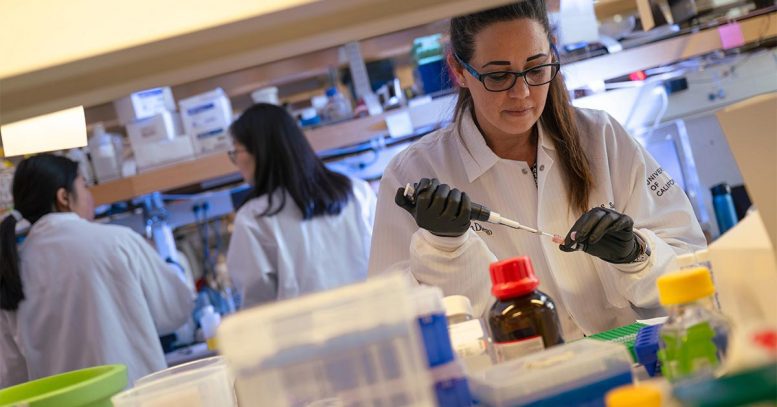
Researchers at UC San Diego have developed an AI tool called POLYGON to speed up early drug discovery by simulating complex chemistry. This technology not only identifies potential drugs rapidly but also focuses on multi-target molecules, which could reduce side effects seen in traditional combination therapies.
The new platform assisted UC San Diego scientists in creating 32 possible multi-target cancer drugs.
Researchers at UC San Diego have created a machine learning algorithm to mimic the time-consuming chemistry involved in the initial stages of drug discovery, which could greatly simplify the process and pave the way for new treatments. Identifying candidate drugs for further improvement usually involves numerous individual experiments, but the new AI platform could potentially yield the same results much faster.
The researchers used the new tool, described today (May 6) in Nature Communications, to synthesize 32 new drug candidates for cancer.
The Move Toward AI in Pharmaceuticals
The technology is part of a growing trend in pharmaceutical science to use AI to enhance drug discovery and development.

Trey Ideker, a professor of medicine, computer science, and bioengineering at UC San Diego, is the senior author.
“A few years ago, AI was a negative term in the pharmaceutical industry, but now the trend is definitely the opposite, with biotech startups struggling to raise funds without incorporating AI into their business plan,” said Trey Ideker, a professor at UC San Diego School of Medicine. “AI-guided drug discovery has become a very active area in industry, but unlike the methods being developed in companies, we’re making our technology open source and accessible to anybody who wants to use it.”
Benefits of Multi-Target Drug Discovery
The new platform, known as POLYGON, is special among AI tools for drug discovery as it can identify molecules with multiple targets, while existing drug discovery protocols currently prioritize single target therapies. Multi-target drugs are of significant interest to doctors and scientists because of their potential to provide the same benefits as combination therapy, in which several different drugs are used together to treat cancer, but with fewer side effects.
“It takes many years and millions of dollars to find and develop a new drug, especially if we’re talking about one with multiple targets,” said Ideker. “The rare few multi-target drugs we do have were discovered largely by chance, but this new technology could help take chance out of the equation and kickstart a new generation of precision medicine.”
How POLYGON Operates
The researchers trained POLYGON on a database of over a million known bioactive molecules containing detailed information about their chemical properties and known interactions with protein targets. By learning from patterns found in the database, POLYGON can produce original chemical formulas for new candidate drugs that are likely to have certain properties, such as the ability to inhibit specific proteins.
"Just like AI is now very good at creating original drawings and images, such as making images of human faces based on specific traits like age or sex, POLYGON can create original molecular compounds based on specific chemical properties," explained Ideker. "In this case, instead of instructing the AI on how old we want our face to appear, we're instructing it on how we want our future drug to interact with disease proteins."

Study co-author Katherine Licon, shown here at the bench, is the lab manager for the Ideker Lab at UC San Diego, which combines computational and traditional wet-lab techniques to address fundamental questions about disease biology and discover new ways to improve precision medicine. Credit: Erik Jepsen/UC San Diego
Testing and Results
To test POLYGON, the researchers used it to produce numerous potential drugs that target different sets of cancer-related proteins. From these, they synthesized 32 molecules with the most powerful predicted interactions with the MEK1 and mTOR proteins, a pair of cellular signaling proteins that are a promising target for combination therapy in cancer. These two proteins are considered synthetically lethal by scientists, meaning that inhibiting both together is sufficient to destroy cancer cells even if inhibiting one alone is not.
The researchers discovered that the synthesized drugs exhibited significant activity against MEK1 and mTOR, while having minimal unintended reactions with other proteins. This indicates that one or more of the drugs identified by POLYGON could potentially target both proteins as a treatment for cancer, offering a range of options for refinement by human chemists.
"Even after obtaining the potential drugs, there is still a need to carry out all the additional chemistry required to refine those options into a single, effective treatment," Ideker noted. "We cannot and should not attempt to eliminate human expertise from the drug discovery process, but we can expedite certain steps of the process."
Future of AI in Drug Discovery
Despite this caution, the researchers are optimistic that the potential of AI in drug discovery is just beginning to be explored.
"Observing how this concept unfolds over the next decade, both in academia and the private sector, is going to be very exciting," Ideker expressed. "The possibilities are virtually endless."
Reference: 6 May 2024, Nature Communications.
Co-authors of the study include: Brenton Munson, Michael Chen, Audrey Bogosian, Jason Kreisberg, Katherine Licon, Abagyan Ruben and Brent Kuenzi, all at UC San Diego.
This study was funded, in part, by the National Institutes of Health (Grants CA274502, GM103504, ES014811, CA243885, CA212456).



